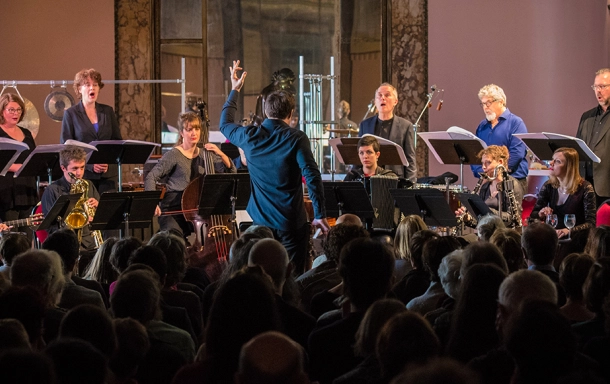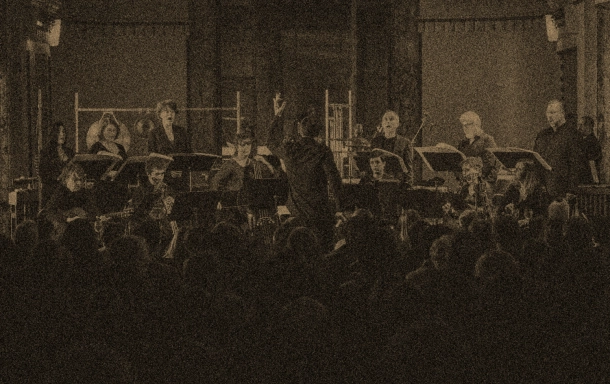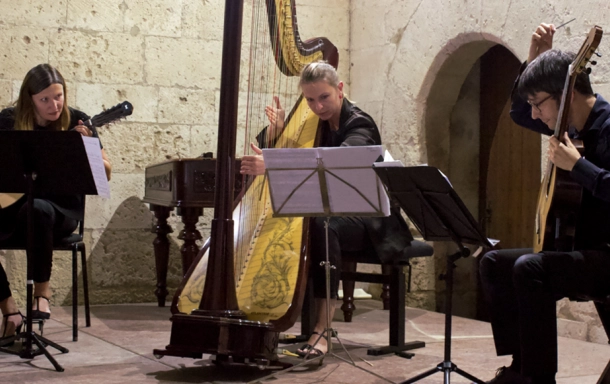Rehearsal residency.
David, the shark and the 700-million-year-old spring is an original musical creation combining a tale by Marguerite Duras, a stroll through the media library and a pictorial and sound lecture on "biophony", the study of the underwater sound world in the calanques of Marseille's coastline.
The story will be set to music by 3 instruments: saxophone, percussion and cello, and an actress-singer. They will invite the audience to visit the media library's story-related sections. This funny and moving tale, taken from Marguerite Duras's "L'Été 80", tells the story of a child, David, and a shark named Ratekétaboum, who takes him in after a shipwreck. David's and the shark's journeys take them across the oceans, swimming between islands, rubbing shoulders with other aquatic beings until they meet "the source", a very old creature made entirely of water. This spring contains the memory of the oceans, emerges from the Atlantic Cistern and, on certain evenings, begins to dance. The spring, like the sea, is the very element of writing. It inspires the temporality of an eternal recommencement caught up in the continuous variation of sensations and colors, in keeping with a profoundly musical theme.
The tale will culminate in a surprise: a lecture in sounds and images, given by a researcher-acoustician from the PRISM laboratory in Marseille.
As part of "Lecture par Nature", an event organized by Métropole Aix-Marseille and coordinated by the agence du livre.
Technical support
GMEM - Centre national de création musicale.
Jean-Christophe Marti
Jean-Christophe Marti, Franco-Swiss composer born in 1964, trained at the CNR de Boulogne Billancourt (piano, clarinet, chamber music, composition) and the CNSM de Paris (aesthetics, history).
He also studied conducting with Jean-Claude Hartemann in Paris and at the Salzburg Mozarteum, before devoting himself to composition under the auspices of Clément Janequin, Marguerite Duras and the satyr Marsyas.
His taste for literary texts led him to write numerous vocal and stage works, which have been commissioned by various ensembles. He won the Maurice Ohana-Sacem Prize with The Last words Virginia Woolf written for 12 voices, and was a laureate of the Fondation Natexis and the Beaumarchais/SACD grant.
He also writes orchestral pieces and creates singular musical spectacles.
His work is at the crossroads of live performance, creative cinema, bushy and precise intellectual research, performances and nomadic or occasional educational interventions.
He also collaborates with a number of internationally renowned theater directors.
Claire Feintrenie
After meeting Angela Gilbert, who introduced her to opera singing, Claire studied at the George Bizet Conservatory in Paris with Sylvie Sullé. Today, she continues to perfect her vocal technique, Baroque singing and melodies with Maarten Koningsberger and Muriel Ferraro. She has appeared on stage in La Veuve Joyeuse (Lehar), Les noces de Figaro (Mozart), and a number of other major works.
Alongside Pierre Gillet, she founded the ensemble Theodora and joined the contemporary music ensemble Traces d'Aujourd'hui, then took part in several new works, notably with Jean-Christophe Marti, Claude Barthelemy and Jean-Claude Wolf. She created the French melody duo La Mésange Bleue with pianist Sophie Théron, and co-founded the Oxymore collective. Since May 2023, Claire has been an associate artist with the Nadine Beaulieu dance company. In 2024, she begins a collaboration with the ensemble Les Pincées Musicales (dir. Florentino Calvo). In August 2024, she will perform Flora (La Traviata) in Philadelphia.
Joël Versavaud
Finalist in the 1996 Jean-Marie Londeix international competition, he recorded Christian Lauba's Neuf études pour saxophones in 2000, earning him the esteem of his peers worldwide. This was followed by the albums Mai solo in 2006, Bach-un souffle continu in 2011, which won the Prix Pierre Barbizet from the Académie de Marseille, and Croquembouches in 2015 (Skarbo) with pianist Laura Caravello. Through his dual activity as a concert artist and teacher at the Marseille Conservatoire, he is committed to developing and promoting the classical saxophone. The author of some fifteen solo works, he has taken part in numerous creations with small and large ensembles. In May 2015, Christian Sébille entrusted him with a saxophone and electroacoustic device recital at the Festival Les Musiques du GMEM Centre National de Création Musicale. Since 2012, he has been invited every year to perform at the Chaillol Festival directed by Michael Dian. He gives concerts and performance courses in the USA, Japan, Canada, Lebanon, Tunisia and at festivals, universities and conservatories throughout Europe.
Claudio Bettinelli
After advanced studies at the Conservatoire National Supérieur de Musique et de Danse de Lyon, in the class of J. Geoffroy, Claudio Bettinelli obtained his certificate with unanimous honors, with a special mention for the originality of the program. That same year, he also won a special prize for instrument originality at the Geneva International Percussion Competition. Musically very open-minded, he has had a wide range of experiences in both classical and contemporary music, as well as in musical theater, improvisation and computer-assisted music. He is percussion soloist with the Ensemble Orchestral Contemporain, and is also a member of the Ensemble C Barré directed by Sébastien Boin, the Ensemble Mezwej directed by Zad Moultaka, and the Odyssée company. Attracted by the relationship between dance and music, he has conceived the musical parts of dance pieces by various choreographers. He conducts pedagogical research and creates unusual tools to make a wider public aware of the potential of today's music.
Marine Rodallec
Trained in Marseille by Chantal Darietto-Latil, Marine then moved to Lyon to complete her training with Patrick Gabard and Yvan Chiffoleau. After winning a gold medal and a prize for excellence, she joined Daniel Grosgurin's class at Geneva's Haute Ecole de Musique, where she completed her studies with a soloist's diploma and the Daniel de Marignac prize. After a year as solo cellist with the orchestra of the Grand Théâtre du Liceu Academy in Barcelona, she returned to her hometown, where she worked with the Café Zimmermann ensemble, joined the Ensemble C Barré in 2012, and collaborated regularly with the baroque ensemble Concerto Soave. In 2021, she will create a trio focusing on the repertoire of women composers, with no limits in terms of period or style. Her desire to share and transmit led her to train and become a European Suzuki teacher. Committed to equal opportunities and accessibility to music, she has been teaching for several years in social projects such as DÉMOS and Orchestre à l'école, and since 2022, at the Pierre Barbizet Conservatory in Marseille.
Sølvi Ystad
Sølvi Ystad obtained her civil engineering degree in electronics from NTH (Norges Tekniske Høgskole), Trondheim, Norway in 1992 and her doctorate in acoustics from the University of Aix-Marseille II, France, in 1998. After a postdoctoral stay at Stanford University, California, she obtained a research position at the Centre National de la Recherche Scientifique (CNRS). Since January 2017, she has been working at the PRISM laboratory (Perception, Representations, Image, Sound, Music) in Marseille, France. Her research activities are centered around sound and multimodal modeling based on the identification of perceptually relevant sound structures, on the development of intuitive control interfaces for auditory and multimodal stimuli and, more generally, on non-verbal communication.
Sébastien Boin
Sébastien Boin is one of a new generation of conductors with a passion for musical creation, who have vigorously forged their own ensembles in their own image. The result is the instrumental ensemble C Barré, dedicated to musical creation, with which he experiments with the dual responsibilities of artistic and musical direction. An enthusiast of both instrumental and vocal music, whose practices he sees as naturally complementary, he maintains a dual career as conductor and choirmaster, and collaborates with world-renowned orchestras and vocal and instrumental ensembles. In 2015, at the request of the University of Aix-Marseille, he founded OSAMU & Co, the symphony orchestra of Aix-Marseille University and the Pierre Barbizet Conservatory of Marseille, of which he is artistic and musical director. In 2016, he was invited by the Festival d'Aix to conduct Ana Sokolovic's opera Svadba during a three-year international tour. He currently teaches choral conducting at the CFMI in Aix-en-Provence and orchestral conducting at the Conservatoire de Marseille.
Jean-Christophe Marti
composition
Claire Feintrenie
mezzo-soprano and actress
Joël Versavaud
saxophone
Claudio Bettinelli
percussion
Marine Rodallec
cello
Sølvi Ystad
Research Director, CNRS / PRISM
Sébastien Boin
artistic direction






